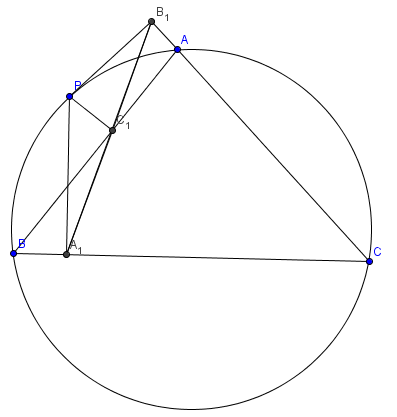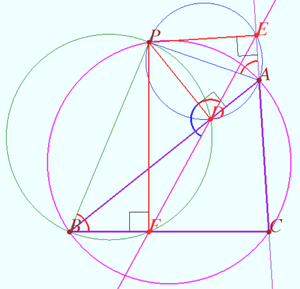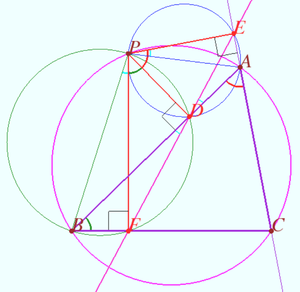Difference between revisions of "Simson line"
(→Simson line (main)) |
(→Simson line (main)) |
||
| Line 5: | Line 5: | ||
In the shown diagram, we draw additional lines <math>AP</math> and <math>BP</math>. Then, we have cyclic quadrilaterals <math>ACBP</math>, <math>PC_1A_1B</math>, and <math>PB_1AC_1</math>. (more will be added) | In the shown diagram, we draw additional lines <math>AP</math> and <math>BP</math>. Then, we have cyclic quadrilaterals <math>ACBP</math>, <math>PC_1A_1B</math>, and <math>PB_1AC_1</math>. (more will be added) | ||
==Simson line (main)== | ==Simson line (main)== | ||
| − | [[File:Simson line.png| | + | [[File:Simson line.png|300px|right]] |
Let a triangle <math>\triangle ABC</math> and a point <math>P</math> be given. Let <math>D, E,</math> and <math>F</math> be the foots of the perpendiculars dropped from P to lines AB, AC, and BC, respectively. | Let a triangle <math>\triangle ABC</math> and a point <math>P</math> be given. Let <math>D, E,</math> and <math>F</math> be the foots of the perpendiculars dropped from P to lines AB, AC, and BC, respectively. | ||
| Line 18: | Line 18: | ||
<math>ACBP</math> is cyclic <math>\implies \angle PBC = \angle PAE \implies \angle PDF + \angle PDE = 180^\circ</math> | <math>ACBP</math> is cyclic <math>\implies \angle PBC = \angle PAE \implies \angle PDF + \angle PDE = 180^\circ</math> | ||
<math>\implies D, E,</math> and <math>F</math> are collinear as desired. | <math>\implies D, E,</math> and <math>F</math> are collinear as desired. | ||
| + | |||
| + | <i><b>Proof</b></i> | ||
Let the points <math>D, E,</math> and <math>F</math> be collinear. | Let the points <math>D, E,</math> and <math>F</math> be collinear. | ||
| − | [[File:Simson line inverse.png| | + | [[File:Simson line inverse.png|300px|right]] |
<math>AEPD</math> is cyclic <math>\implies \angle APE = \angle ADE, \angle APE = \angle BAC.</math> | <math>AEPD</math> is cyclic <math>\implies \angle APE = \angle ADE, \angle APE = \angle BAC.</math> | ||
<math>BFDP</math> is cyclic <math>\implies \angle BPF = \angle BDF, \angle DPF = \angle ABC.</math> | <math>BFDP</math> is cyclic <math>\implies \angle BPF = \angle BDF, \angle DPF = \angle ABC.</math> | ||
Revision as of 14:45, 30 November 2022
In geometry, given a triangle ABC and a point P on its circumcircle, the three closest points to P on lines AB, AC, and BC are collinear.

Proof
In the shown diagram, we draw additional lines ![]() and
and ![]() . Then, we have cyclic quadrilaterals
. Then, we have cyclic quadrilaterals ![]() ,
, ![]() , and
, and ![]() . (more will be added)
. (more will be added)
Simson line (main)
Let a triangle ![]() and a point
and a point ![]() be given. Let
be given. Let ![]() and
and ![]() be the foots of the perpendiculars dropped from P to lines AB, AC, and BC, respectively.
be the foots of the perpendiculars dropped from P to lines AB, AC, and BC, respectively.
Then points ![]() and
and ![]() are collinear iff the point
are collinear iff the point ![]() lies on circumcircle of
lies on circumcircle of ![]()
Proof
Let the point ![]() be on the circumcircle of
be on the circumcircle of ![]()
![]() is cyclic
is cyclic ![]()
![]() is cyclic
is cyclic ![]()
![]() is cyclic
is cyclic ![]()
![]() and
and ![]() are collinear as desired.
are collinear as desired.
Proof
Let the points ![]() and
and ![]() be collinear.
be collinear.
![]() is cyclic
is cyclic ![]()
![]() is cyclic
is cyclic ![]()
![]()
![]() is cyclis as desired.
is cyclis as desired.
vladimir.shelomovskii@gmail.com, vvsss











